初中英语副词总结归纳大全
初中英语知识点总结:英语副词精华讲解

初中英语知识点总结:英语副词精华讲解一. 定义:副词主要用来修饰动词,形容词,副词或其他结构。
一般副词主要分为以下几种:①.时间副词, 如: often, always, early, now②.地点副词, 如: here, there, above, outside③.方式副词, 如: hard, well, badly, fast, slowly④.程度副词, 如: very, quite, much, still, almost2.疑问副词(放在特殊疑问句的句首), 如: how, when, where, why3.关系副词(放在定语从句句首), 如: when, where, why4.连接副词(放在名词从句句首), 如: how, when, where, why, whether二. 副词的位置:1) 在实义动词之前。
2) 在be动词、助动词之后。
3) 多个助动词时,副词一般放在第一个助动词后。
注意:a. 大多数方式副词位于句尾,但宾语过长,副词可以提前,以使句子平衡。
例如:We could see very clearly a strange light ahead of us.我们清楚地看到前面有奇怪的光。
b. 方式副词well,badly,hard等只放在句尾。
例如:He speaks English well. 他英语说得好。
三. 副词的排列顺序:1) 时间,地点副词,小单位的在前,大单位在后。
2) 方式副词,短的在前,长的在后,并用and或but等连词连接。
例如:Please write slowly and carefully. 请写得慢一些,仔细一些3) 多个不同副词排列:程度+地点+方式+时间副词。
注意:副词very 可以修饰形容词,但不能修饰动词。
改错:(错)I very like English.(对)I like English very much.注意:副词enough要放在形容词的后面,形容词enough放在名词前后都可。
中考词汇分类副词
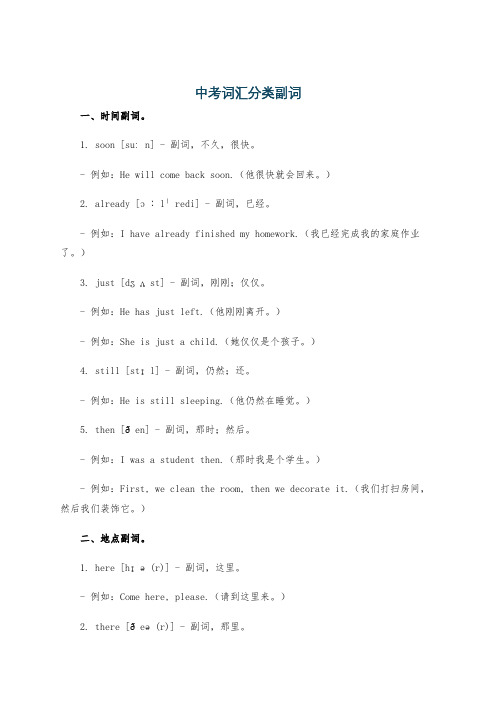
中考词汇分类副词一、时间副词。
1. soon [suːn] - 副词,不久,很快。
- 例如:He will come back soon.(他很快就会回来。
)2. already [ɔːlˈredi] - 副词,已经。
- 例如:I have already finished my homework.(我已经完成我的家庭作业了。
)3. just [dʒʌst] - 副词,刚刚;仅仅。
- 例如:He has just left.(他刚刚离开。
)- 例如:She is just a child.(她仅仅是个孩子。
)4. still [stɪl] - 副词,仍然;还。
- 例如:He is still sleeping.(他仍然在睡觉。
)5. then [ðen] - 副词,那时;然后。
- 例如:I was a student then.(那时我是个学生。
)- 例如:First, we clean the room, then we decorate it.(我们打扫房间,然后我们装饰它。
)二、地点副词。
1. here [hɪə(r)] - 副词,这里。
- 例如:Come here, please.(请到这里来。
)2. there [ðeə(r)] - 副词,那里。
- 例如:There is a book on the desk.(桌子上有一本书。
)3. everywhere [ˈevriweə(r)] - 副词,到处;处处。
- 例如:I can see flowers everywhere in spring.(在春天我到处都能看到花。
)4. nowhere [ˈnəʊweə(r)] - 副词,无处;哪里都不。
- 例如:There is nowhere to hide.(无处可藏。
)三、方式副词。
1. carefully [ˈkeəfəli] - 副词,仔细地;小心地。
- 例如:He reads the book carefully.(他仔细地读书。
中考英语常见副词最全总结
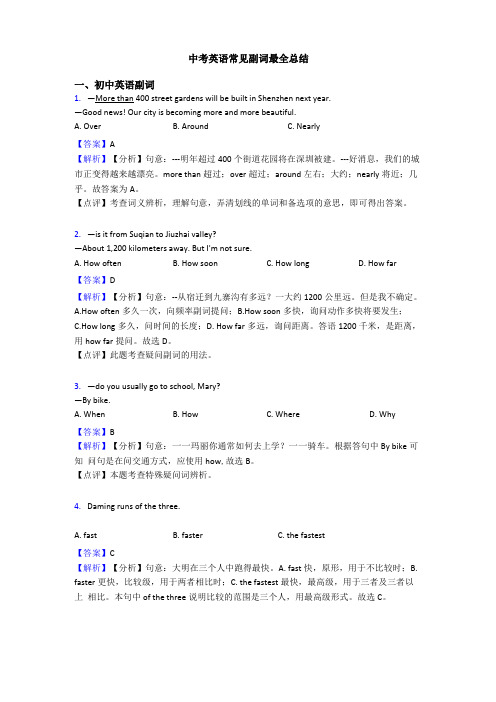
中考英语常见副词最全总结一、初中英语副词1.—More than 400 street gardens will be built in Shenzhen next year.—Good news! Our city is becoming more and more beautiful.A. OverB. AroundC. Nearly【答案】A【解析】【分析】句意:---明年超过400个街道花园将在深圳被建。
---好消息,我们的城市正变得越来越漂亮。
more than超过;over超过;around左右;大约;nearly将近;几乎。
故答案为A。
【点评】考查词义辨析,理解句意,弄清划线的单词和备选项的意思,即可得出答案。
2.—is it from Suqian to Jiuzhai valley?—About 1,200 kilometers away. But I'm not sure.A. How oftenB. How soonC. How longD. How far【答案】D【解析】【分析】句意:--从宿迁到九寨沟有多远?一大约1200公里远。
但是我不确定。
A.How often多久一次,向频率副词提问;B.How soon多快,询问动作多快将要发生;C.How long多久,问时间的长度;D. How far多远,询问距离。
答语1200千米,是距离,用how far提问。
故选D。
【点评】此题考查疑问副词的用法。
3.—do you usually go to school, Mary?—By bike.A. WhenB. HowC. WhereD. Why【答案】B【解析】【分析】句意:一一玛丽你通常如何去上学?一一骑车。
根据答句中By bike可知问句是在问交通方式,应使用how,故选B。
【点评】本题考查特殊疑问词辨析。
4.Daming runs of the three.A. fastB. fasterC. the fastest【答案】C【解析】【分析】句意:大明在三个人中跑得最快。
初中英语语法知识精讲:常用副词考法归纳6
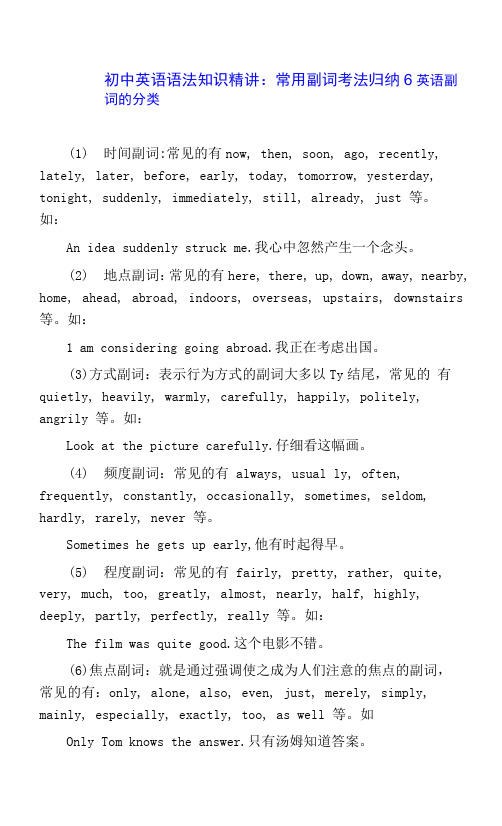
初中英语语法知识精讲:常用副词考法归纳6英语副词的分类(1)时间副词:常见的有now, then, soon, ago, recently, lately, later, before, early, today, tomorrow, yesterday, tonight, suddenly, immediately, still, already, just 等。
如:An idea suddenly struck me.我心中忽然产生一个念头。
(2)地点副词:常见的有here, there, up, down, away, nearby, home, ahead, abroad, indoors, overseas, upstairs, downstairs 等。
如:1am considering going abroad.我正在考虑出国。
(3)方式副词:表示行为方式的副词大多以Ty结尾,常见的有quietly, heavily, warmly, carefully, happily, politely,angrily 等。
如:Look at the picture carefully.仔细看这幅画。
(4)频度副词:常见的有 always, usual ly, often, frequently, constantly, occasionally, sometimes, seldom, hardly, rarely, never 等。
Sometimes he gets up early,他有时起得早。
(5)程度副词:常见的有 fairly, pretty, rather, quite, very, much, too, greatly, almost, nearly, half, highly, deeply, partly, perfectly, really 等。
如:The film was quite good.这个电影不错。
初中英语副词总结归纳大全
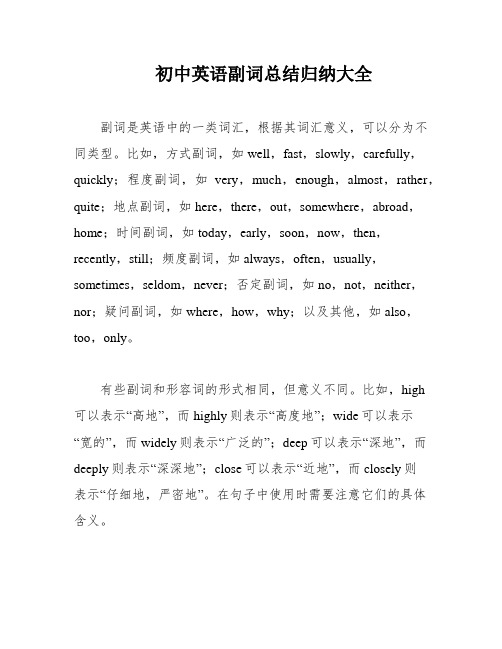
初中英语副词总结归纳大全副词是英语中的一类词汇,根据其词汇意义,可以分为不同类型。
比如,方式副词,如well,fast,slowly,carefully,quickly;程度副词,如very,much,enough,almost,rather,quite;地点副词,如here,there,out,somewhere,abroad,home;时间副词,如today,early,soon,now,then,recently,still;频度副词,如always,often,usually,sometimes,seldom,never;否定副词,如no,not,neither,nor;疑问副词,如where,how,why;以及其他,如also,too,only。
有些副词和形容词的形式相同,但意义不同。
比如,high可以表示“高地”,而highly则表示“高度地”;wide可以表示“宽的”,而widely则表示“广泛的”;deep可以表示“深地”,而deeply则表示“深深地”;close可以表示“近地”,而closely则表示“仔细地,严密地”。
在句子中使用时需要注意它们的具体含义。
还有一些副词虽然形式不同,但意义相近。
比如,XXX表示“迟,晚”,而XXX则表示“最近”;hard表示“努力的,艰苦地”,而hardly则表示“几乎不”;just可以表示“刚刚,仅仅,恰好”,而justly则表示“公正地,正当地”;most可以表示“很,最”,而mostly则表示“主要地”,而almost则表示“几乎,差不多”。
最后,需要注意一些副词的区别。
比如,already用于肯定句中,表示“已经”,而yet用于否定句末,表示“还”,用于疑问句末,表示“已经”。
例如,“He had already left when I called.”(当我给他打电话时,他已经离开了。
)Have you found your ruler yet。
中考英语必会的70个副词
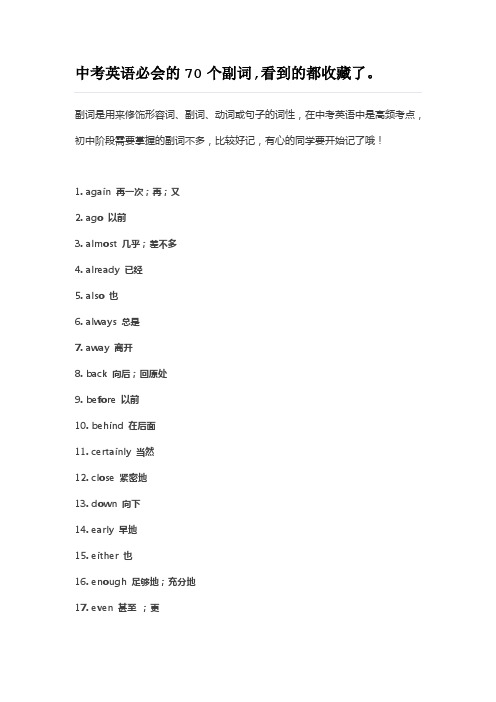
中考英语必会的70个副词,看到的都收藏了。
副词是用来修饰形容词、副词、动词或句子的词性,在中考英语中是高频考点,初中阶段需要掌握的副词不多,比较好记,有心的同学要开始记了哦!1. again 再一次;再;又2. ago 以前3. almost 几乎;差不多4. already 已经5. also 也6. always 总是7. away 离开8. back 向后;回原处9. before 以前10. behind 在后面11. certainly 当然12. close 紧密地13. down 向下14. early 早地15. either 也16. enough 足够地;充分地17. even 甚至;更18. ever 曾经;无论何时19. everywhere 到处20. far 远地21. fast 快地22. first 最初23. hard 努力地;(下雨/ 下雪等)猛烈地24. hardly 几乎不25. here 这里;在这里;向这里26. home 回家;到家27. how 怎样;多么28. in 在家;向内29. instead 相反30. just 正好;刚刚;仅31. late 迟地;晚地32. later 之后;后来33. left 向左34. little 几乎不35. loud 大声地36. much 非常37. neither 也不38. never 决不;从来不39. not 不40. now 现在41. off 离开,掉落42. often 经常43. on 进行中44. once 从前45. only 只;仅仅46. over 结束47. perhaps 可能;也许48. quickly 快地;迅速地49. quite 完全;十分50. rather 相当;宁可51. really 真正地;确实52. since 自从那时以来53. slowly 慢地54. so 如此55. sometimes 有时56. soon 很快;不久57. still 仍然;还58. suddenly 突然59. then 那时;然后60. there 在(往)那儿;表示“存在”61. today 今天;现今62. together 一起63. tomorrow 明天64. tonight 今天晚上65. too 也;太66. twice 两次;两倍67. usually 通常68. very 很;非常69. well 好地70. when 在什么时候71. where 在(往)哪里72. why 为什么73. yes 是74. yet 还;仍然;但是。
初中英语常见的副词归纳
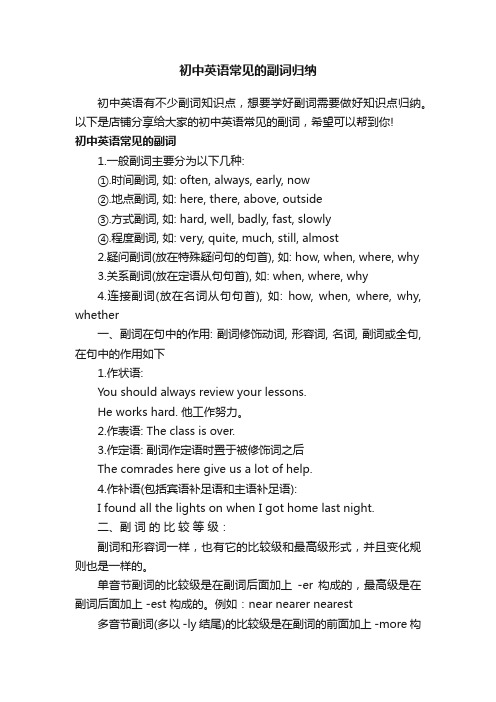
初中英语常见的副词归纳初中英语有不少副词知识点,想要学好副词需要做好知识点归纳。
以下是店铺分享给大家的初中英语常见的副词,希望可以帮到你!初中英语常见的副词1.一般副词主要分为以下几种:①.时间副词, 如: often, always, early, now②.地点副词, 如: here, there, above, outside③.方式副词, 如: hard, well, badly, fast, slowly④.程度副词, 如: very, quite, much, still, almost2.疑问副词(放在特殊疑问句的句首), 如: how, when, where, why3.关系副词(放在定语从句句首), 如: when, where, why4.连接副词(放在名词从句句首), 如: how, when, where, why, whether一、副词在句中的作用: 副词修饰动词, 形容词, 名词, 副词或全句, 在句中的作用如下1.作状语:You should always review your lessons.He works hard. 他工作努力。
2.作表语: The class is over.3.作定语: 副词作定语时置于被修饰词之后The comrades here give us a lot of help.4.作补语(包括宾语补足语和主语补足语):I found all the lights on when I got home last night.二、副词的比较等级:副词和形容词一样,也有它的比较级和最高级形式,并且变化规则也是一样的。
单音节副词的比较级是在副词后面加上-er 构成的,最高级是在副词后面加上 -est 构成的。
例如:near nearer nearest多音节副词(多以 -ly 结尾)的比较级是在副词的前面加上 -more 构成的。
最高级是在副词前面加上-most 构成的.例如;warmly more warmly most warmly有些副词的比较级和最高级形式是不规则的:well-better - best little - less - leastmuch- more - most badly - worse - worstfar-farther(further)-farthest(furthest)副词的比较级和最高级用法同形容词的比较级用法基本一样,两者比较用比较级,三者或以上用最高级,但是副词最高级形式句中the 可以省略。
初中英语单词重点副词大全

初中英语单词重点副词大全1. always [ˈɔːlweɪz] 始终;总是Tom is always late for school.汤姆上学总是迟到。
2. never [ˈnevər] 从不I never eat fast food.我从不吃快餐。
3. sometimes [ˈsʌmtaɪmz] 有时候We sometimes go to the park on weekends.我们有时候在周末去公园。
4. often [ˈɔːfn] 经常She often helps her mother with the housework.她经常帮忙做家务。
5. usually [ˈjuːʒuəli] 通常We usually have dinner at 6 o'clock.我们通常在六点吃晚饭。
6. occasionally [əˈkeɪʒənəli] 偶尔;有时I occasionally go swimming in summer.我夏天偶尔去游泳。
7. rarely [ˈreərli] 很少;不常He rarely watches TV.他很少看电视。
8. seldom [ˈseldəm] 很少;不常She seldom goes to the movies.她很少去电影院。
9. already [ɔːlˈredi] 已经I have already finished my homework.我已经完成作业了。
10. yet [jet] 尚未Have you finished your breakfast yet?你早餐吃完了吗?11. still [stɪl] 仍然The baby is still sleeping.那个宝宝还在睡觉。
12. just [dʒʌst] 刚刚I have just arrived at the airport.我刚刚到达机场。
13. really [ˈriːəli] 真地;非常The movie was really exciting.那部电影真的很 ** 。
人教版九年级英语全一册 副词表
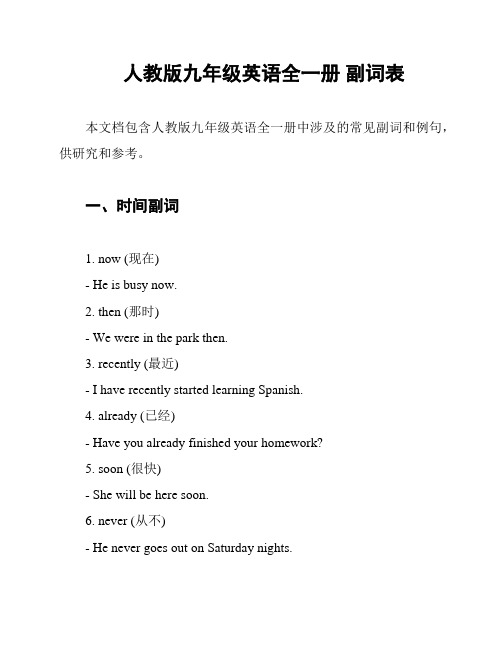
人教版九年级英语全一册副词表本文档包含人教版九年级英语全一册中涉及的常见副词和例句,供研究和参考。
一、时间副词1. now (现在)- He is busy now.2. then (那时)- We were in the park then.3. recently (最近)- I have recently started learning Spanish.4. already (已经)- Have you already finished your homework?5. soon (很快)- She will be here soon.6. never (从不)- He never goes out on Saturday nights.二、地点副词1. here (这里)2. there (那里)- He is not there anymore.3. everywhere (到处)- The flowers are blooming everywhere.4. nowhere (无处)- I can find the book nowhere.5. abroad (国外)- She has been working abroad for two years.三、方式副词1. carefully (仔细地)- He read the instructions carefully.2. quickly (快速地)- She finished the race quickly.3. slowly (慢慢地)- He walked slowly in the park.4. quietly (安静地)- The students were working quietly in the classroom.5. loudly (大声地)- He shouted loudly in excitement.四、频率副词1. always (总是)- She always helps her friends when they need her. 2. often (经常)- He often goes to the gym after work.3. sometimes (有时候)- Sometimes it rains heavily in summer.4. never (从不)- He never drinks coffee before bedtime.5. rarely (很少)- I rarely eat fast food.五、程度副词1. very (非常)- The movie was very interesting.2. quite (相当)- The exam was quite difficult.3. too (太)- It's too cold to go swimming today.4. so (如此)- The pizza was so delicious that I ate too much.5. enough (足够)- She is old enough to start driving.六、疑问副词1. why (为什么)- Why did you quit your job?2. when (什么时候)3. where (在哪里)- Where is the nearest hospital?4. how (如何)- How did you learn to play the piano?5. what (什么)- What is your favorite color?七、连接副词1. however (然而)- He is not very intelligent. However, he is a hard worker.2. therefore (因此)- He didn't study and therefore he failed the test.3. otherwise (否则)- Please turn off the lights, otherwise the battery will die.4. moreover (此外)- She is very smart. Moreover, she is kind-hearted.5. nevertheless (然而)- The weather is bad. Nevertheless, I will go for a walk.以上是人教版九年级英语全一册中常见的副词和例句,希望对大家有所帮助。
(完整版)初中英语副词总结归纳大全
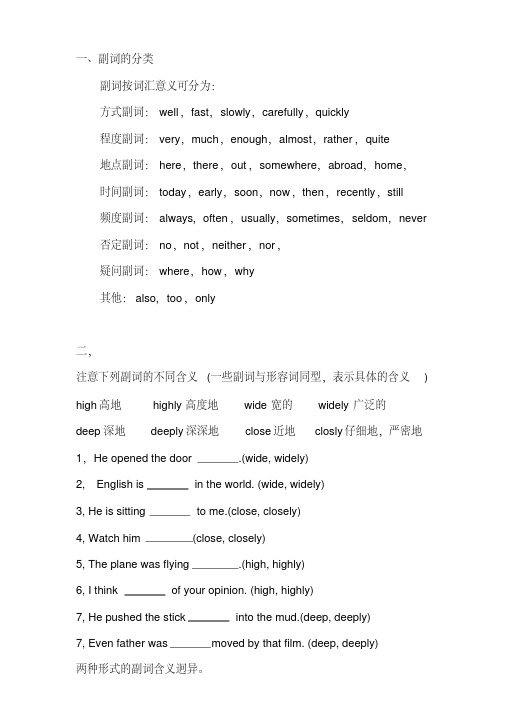
一、副词的分类副词按词汇意义可分为:方式副词:well,fast,slowly,carefully,quickly程度副词:very,much,enough,almost,rather,quite地点副词:here,there,out,somewhere,abroad,home,时间副词:today,early,soon,now,then,recently,still频度副词:always,often,usually,sometimes,seldom,never 否定副词:no,not,neither,nor,疑问副词:where,how,why其他:also,too,only二,注意下列副词的不同含义(一些副词与形容词同型,表示具体的含义) high高地highly高度地wide宽的widely广泛的deep深地deeply深深地close近地closly仔细地,严密地1,He opened the door .(wide, widely)2, English is in the world. (wide, widely)3, He is sitting to me.(close, closely)4, Watch him (close, closely)5, The plane was flying .(high, highly)6, I think of your opinion. (high, highly)7, He pushed the stick into the mud.(deep, deeply)7, Even father was moved by that film. (deep, deeply)两种形式的副词含义迥异。
late迟,晚lately最近hard努力的,艰苦地hardly几乎不just刚刚,仅仅,恰好justly公正地,正当地most很,最mostly主要地almost几乎,差不多三,其它副词比较:1, already与yet的区别already用于肯定句句中,表示“已经”;yet用于否定句句末,表示“还”,用于疑问句句末,表示“已经”例如,He had already left when I called.当我给他打电话时,他已经离开了。
初中英语语法---副词
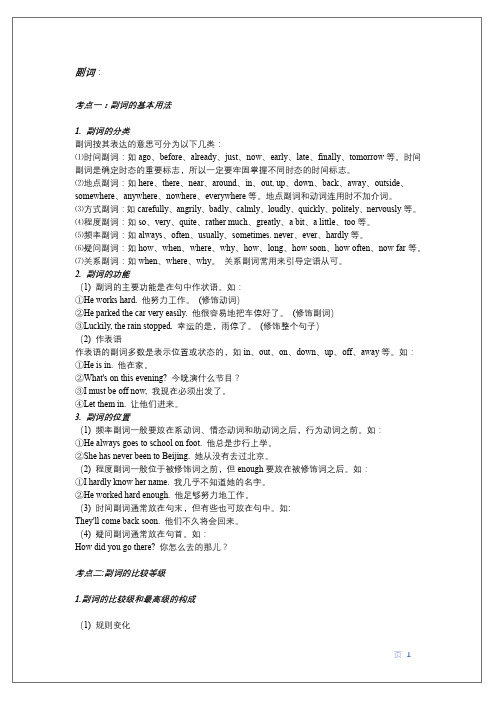
副词:考点一:副词的基本用法1. 副词的分类副词按其表达的意思可分为以下几类:⑴时间副词:如ago、before、already、just、now、early、late、finally、tomorrow等。
时间副词是确定时态的重要标志,所以一定要牢固掌握不同时态的时间标志。
⑵地点副词:如here、there、near、around、in、out, up、down、back、away、outside、somewhere、anywhere、nowhere、everywhere等。
地点副词和动词连用时不加介词。
⑶方式副词:如carefully、angrily、badly、calmly、loudly、quickly、politely、nervously等。
⑷程度副词:如so、very、quite、rather much、greatly、a bit、a little、too等。
⑸频率副词:如always、often、usually、sometimes. never、ever、hardly等。
⑹疑问副词:如how、when、where、why、how、long、how soon、how often、now far等。
⑺关系副词:如when、where、why。
关系副词常用来引导定语从可。
2. 副词的功能(1) 副词的主要功能是在句中作状语。
如:①He works hard. 他努力工作。
(修饰动词)②He parked the car very easily. 他很容易地把车停好了。
(修饰副词)③Luckily, the rain stopped. 幸运的是,雨停了。
(修饰整个句子)(2) 作表语作表语的副词多数是表示位置或状态的,如in、out、on、down、up、off、away等。
如:①He is in. 他在家。
②What's on this evening? 今晚演什么节目?③I must be off now, 我现在必须出发了。
英语常见副词
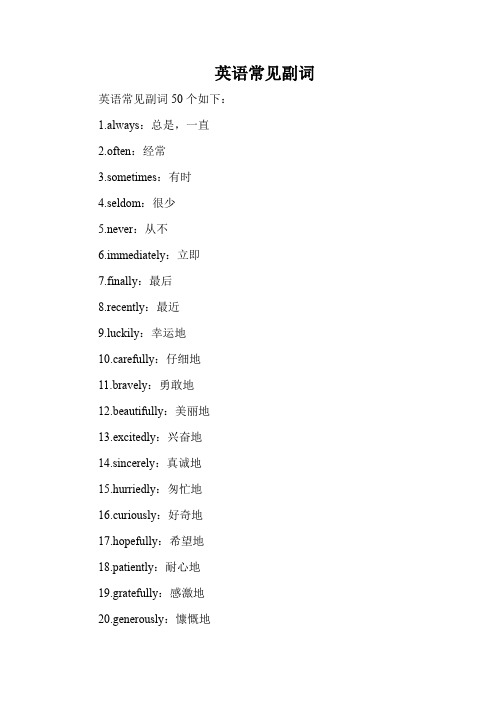
英语常见副词英语常见副词50个如下:1.always:总是,一直2.often:经常3.sometimes:有时4.seldom:很少5.never:从不6.immediately:立即7.finally:最后8.recently:最近9.luckily:幸运地10.carefully:仔细地11.bravely:勇敢地12.beautifully:美丽地13.excitedly:兴奋地14.sincerely:真诚地15.hurriedly:匆忙地16.curiously:好奇地17.hopefully:希望地18.patiently:耐心地19.gratefully:感激地20.generously:慷慨地21.indirectly:间接地22.frequently:频繁地23.loudly:大声地24.proudly:自豪地25.secretly:秘密地26.smoothly:顺利地27.suddenly:突然28.passionately:热情地29.confidently:自信地30.gratefully:感激地31.roughly:粗略地32.responsibly:负责任地33.peacefully:和平地34.luckily:幸运地35.successfully:成功地36.luckily:幸运地37.creatively:创造性地38.efficiently:高效地39.ambitiously:雄心壮志地40.cautiously:谨慎地41.painstakingly:刻苦地42.unwillingly:不乐意地43.respectively:分别地44.wholeheartedly:全心全意地45.unexpectedly:出乎意料地46.understandably:可理解地47.unexpectedly:出乎意料地48.thankfully:感激地49.fortunately:幸运地50.eventually:最终。
初中副词的知识点总结大全
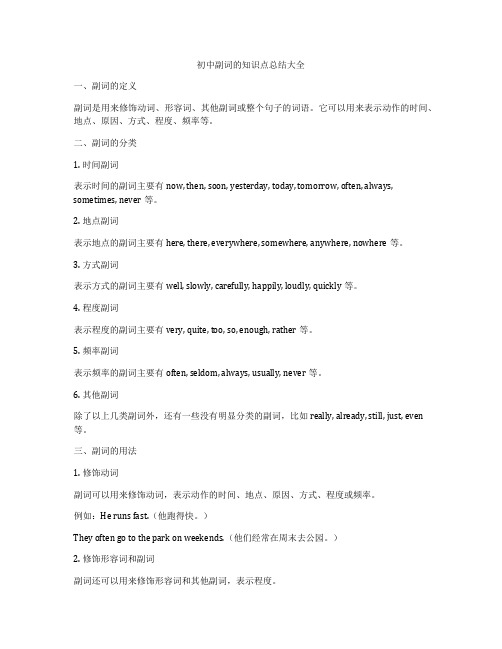
初中副词的知识点总结大全一、副词的定义副词是用来修饰动词、形容词、其他副词或整个句子的词语。
它可以用来表示动作的时间、地点、原因、方式、程度、频率等。
二、副词的分类1. 时间副词表示时间的副词主要有now, then, soon, yesterday, today, tomorrow, often, always, sometimes, never等。
2. 地点副词表示地点的副词主要有here, there, everywhere, somewhere, anywhere, nowhere等。
3. 方式副词表示方式的副词主要有well, slowly, carefully, happily, loudly, quickly等。
4. 程度副词表示程度的副词主要有very, quite, too, so, enough, rather等。
5. 频率副词表示频率的副词主要有often, seldom, always, usually, never等。
6. 其他副词除了以上几类副词外,还有一些没有明显分类的副词,比如really, already, still, just, even 等。
三、副词的用法1. 修饰动词副词可以用来修饰动词,表示动作的时间、地点、原因、方式、程度或频率。
例如:He runs fast.(他跑得快。
)They often go to the park on weekends.(他们经常在周末去公园。
)2. 修饰形容词和副词副词还可以用来修饰形容词和其他副词,表示程度。
例如:She is very beautiful.(她非常漂亮。
)3. 修饰整个句子副词还可以用来修饰整个句子,表示说话人的态度、角度或者整个句子的总体情况。
例如:Hopefully, everything will be fine.(希望一切顺利。
)四、副词的用法注意事项1. 位置副词一般放在被修饰的词语之后,但有时也会放在被修饰的词语之前。
初中英语副词大全
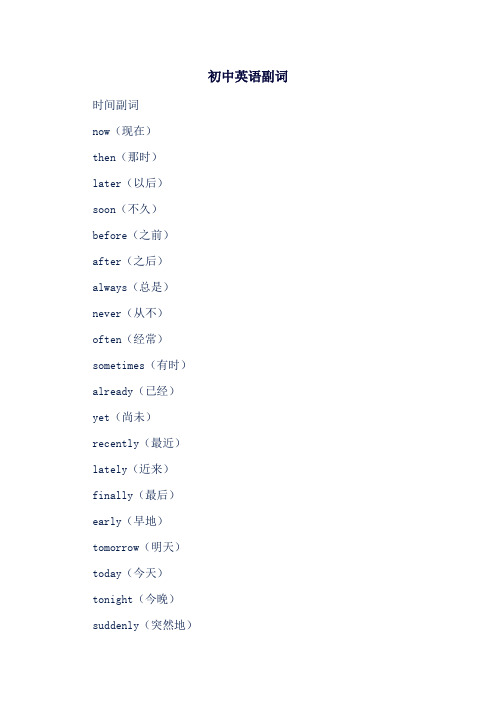
初中英语副词时间副词now(现在)then(那时)later(以后)soon(不久)before(之前)after(之后)always(总是)never(从不)often(经常)sometimes(有时)already(已经)yet(尚未)recently(最近)lately(近来)finally(最后)early(早地)tomorrow(明天)today(今天)tonight(今晚)suddenly(突然地)immediately(立刻)地点副词here(这里)there(那里)everywhere(到处)somewhere(某处)nowhere(无处)upstairs(楼上)downstairs(楼下)outside(外面)inside(里面)nearby(附近地)home(回家)abroad(在国外)indoors(在室内)overseas(在海外)halfway(半途)ahead(在前面)方向副词up(向上)down(向下)in(向里)out(向外)away(离开)toward(朝向)over(越过)under(在下面)across(横过)方式副词carefully(仔细地)happily(快乐地)quietly(安静地)heavily(大量地)warmly(温暖地)correctly(正确地)politely(有礼貌地)angrily(愤怒地)slowly(慢慢地)quickly(快速地)loudly(大声地)hardly(几乎不)well(好地)频率副词always(总是)frequently(频繁地)occasionally(偶尔)often(经常)repeatedly(重复地)usually(通常)rarely(很少地)scarcely(几乎不)seldom(很少)程度副词very(非常)too(太)enough(足够地)almost(几乎)nearly(几乎)just(刚刚)quite(相当)much(十分)greatly(大大地)highly(高度地)deeply(深深地)partly(部分地)really(真正地)fairly(相当地)pretty(相当地)rather(相当)情态副词can(可能,表示能力或允许)could(可能,表示过去的能力或允许)may(可能,表示请求或允许)might(可能,表示更不确定的可能性)will(将会,表示将来的意愿或预测)would(将会,表示过去的意愿或虚拟语气)shall(将会,主要用于第一人称)should(应该,表示责任或建议)must(必须,表示强烈的必要性)ought to(应该,表示道义上的责任)。
初中英语知识点归纳常见的副词短语用法总结
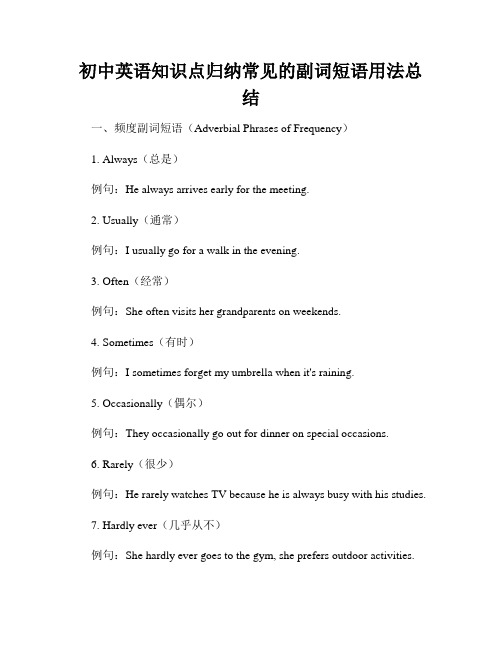
初中英语知识点归纳常见的副词短语用法总结一、频度副词短语(Adverbial Phrases of Frequency)1. Always(总是)例句:He always arrives early for the meeting.2. Usually(通常)例句:I usually go for a walk in the evening.3. Often(经常)例句:She often visits her grandparents on weekends.4. Sometimes(有时)例句:I sometimes forget my umbrella when it's raining.5. Occasionally(偶尔)例句:They occasionally go out for dinner on special occasions.6. Rarely(很少)例句:He rarely watches TV because he is always busy with his studies.7. Hardly ever(几乎从不)例句:She hardly ever goes to the gym, she prefers outdoor activities.8. Never(从不)例句:They never miss a chance to travel during summer vacation.二、时间副词短语(Adverbial Phrases of Time)1. In the morning/afternoon/evening(在早晨/下午/晚上)例句:I exercise in the morning before going to work.2. On weekdays/weekends(在工作日/周末)例句:I have to work on weekdays but I relax on weekends.3. At night(在晚上)例句:They like to stargaze at night in their backyard.4. By the end of(到...结束)例句:She will finish her project by the end of next week.5. In the meantime(与此同时)例句:While waiting for the bus, he read a book in the meantime.6. At the same time(同时)例句:They arrived at the party at the same time.7. From time to time(时常)例句:He visits his grandparents from time to time.8. All day/night long(整天/整晚)例句:They were dancing all night long at the party.三、地点副词短语(Adverbial Phrases of Place)1. In the park(在公园)例句:They often have picnics in the park on weekends.2. At school(在学校)例句:I met my friends at school during lunch break.3. On the beach(在海滩)例句:They love swimming and sunbathing on the beach.4. In the city/countryside(在城市/农村)例句:She enjoys the tranquility of living in the countryside.5. At home(在家)例句:He spends most of his weekends at home with his family. 6. On the way(在路上)例句:They had a great conversation on the way to the airport. 7. Across the road(在马路对面)例句:The supermarket is just across the road, it's very convenient.四、方式副词短语(Adverbial Phrases of Manner)1. In a hurry(匆忙地)例句:She left the house in a hurry because she was late for work.2. With pleasure(乐意地)例句:I will help you move next week, with pleasure.3. In a loud voice(大声地)例句:He shouted in a loud voice to get the attention of the audience.4. On purpose(故意地)例句:He spilled the drink on purpose to annoy his sister.5. By accident(偶然地)例句:I found this lost wallet by accident while walking in the park.6. In a funny way(滑稽地)例句:He imitates his teacher in a funny way and makes everyone laugh.7. In a serious manner(严肃地)例句:The teacher spoke to the students in a serious manner about their behavior.总结:副词短语在英语中起到修饰动词、形容词、副词和整个句子的作用,能够更准确地表达出时间、地点、方式和频率等信息。
初中英语之副词知识点汇总

初中英语之副词知识点汇总中考英语知识点:副词概念和分类1.一般副词主要分为以下几种:①.时间副词, 如: often, always, early, now②.地点副词, 如: here, there, above, outside③.方式副词, 如: hard, well, badly, fast, slowly④.程度副词, 如: very, quite, much, still, almost2.疑问副词(放在特殊疑问句的句首), 如: how, when, where, why3.关系副词(放在定语从句句首), 如: when, where, why4.连接副词(放在名词从句句首), 如: how, when, where, why, whether中考英语知识点:副词在句中的作用副词修饰动词, 形容词, 名词, 副词或全句, 在句中的作用如下1.作状语:You should always review your lessons.He works hard. 他工作努力。
2.作表语: The class is over.3.作定语: 副词作定语时置于被修饰词之后The comrades here give us a lot of help.4.作补语(包括宾语补足语和主语补足语):I found all the lights on when I got home last night.中考英语知识点:一些副词的使用方法某些副词,如only,alone,also,too,even,可能只与某个词有关,应尽量使之靠近这个词:Only John(n.)(Nobody else)saw Mary there two days ago.John only saw(v.)Mary(did not talk with her)there two days ago.John saw only Mary(n.)(not anybody else)there two days ago.John saw Mary only there(adv.)(not in any other place)two days ago.John saw Mary there only two days ago(adv-phrase)(not more than two days ago).He alone(Nobody else)loves her.He loved her alone(nobody else).He loves her for her simplicity alone(not for any other reason).Even John(not only his elder brothers and sisters)writes articles for the newspaper.John even writes articles for the newspaper(not only does other things less important).John writes even articles for the newspaper(not only letters,which are easier to write).John writes articles even for the newspaper(not only for his own school).Her husband,too(not only she),spends a lot of money.Her husband spends a lot of money,too(not only earns so much).Her husbnad spends a lot of money on dress too(not only on other things).中考英语知识点:否定意义的副词一个包含否定词(或有否定意义的词)的副词(短语)可以放在“助动词+主语+主要动词”的前面来加以强调:Nowhere can I find a cleaner place.(否定的地点副词或短语)In no other land do I wish to live and die.Neither from the north nor from the south does he come.Only to Asia(=To no other places than Asia)can we export our goodsFrom the Middle East alone(=From no other areas than the Middle East)does this country obtain its oil.Not until sixteen had this great writer learned to write.(否定的时间副词或短语)Never have I said anything to him.(正确)No have I said anything to him.(错句,not虽为否定词,都必须用在短语中,不能单独这样用。
八年级常用的副词知识点

八年级常用的副词知识点副词是我们日常生活和学习中经常使用的一种词类,它可以修饰动词、形容词、副词,表示时间、地点、程度、方式等语法意义。
在英语中,副词属于比较难掌握的语法知识点之一,因此在八年级英语学习中也是一个重要的内容。
下面就跟随本文,了解一下八年级常用的副词知识点吧!一、修饰动词的副词1. 时间副词时间副词主要用来表示动作发生的时间或频率,如:always(总是)、often(经常)、usually(通常)、sometimes(有时)、rarely(很少)、never(从不)等。
例如:He always studies hard.(他总是努力学习。
)She never misses a class.(她从不缺课。
)2. 地点副词地点副词主要用来表示动作发生的位置或方向,如:here(这里)、there(那里)、up(向上)、down(向下)、in(在里面)、out(在外面)等。
例如:He put the book down on the table.(他把书放在桌子上。
)She walked into the room.(她走进了房间。
)3. 程度副词程度副词主要用来表示动作的强度或程度,如:very(非常)、quite(相当)、too(过于)、enough(足够)、almost(几乎)等。
例如:She is very good at singing.(她唱歌非常好。
)He is almost as tall as his father.(他和他的父亲差不多一样高。
)二、修饰形容词的副词1. 程度副词前面已经提到了,程度副词可以不仅可以修饰动词,还可以修饰形容词。
用来表示形容词的程度,如:very(非常)、quite(相当)、too(过于)、pretty(相当)等。
例如:She is very beautiful.(她很漂亮。
)He is pretty smart.(他相当聪明。
)2. 形容词副词形容词副词是一种特殊的副词,它是由形容词加“-ly”构成,其作用和副词相似,例如:slowly(慢慢地)、quickly(快速地)、happily(开心地)、sadly(悲伤地)等。
根据最新英语人教版七年级上册副词固定搭配归纳

根据最新英语人教版七年级上册副词固定搭配归纳根据最新英语人教版七年级上册的内容,以下是对副词固定搭配的归纳:1. Always:- 表示持续或频繁的动作,通常用于一般现在时- 例句:I always wake up early in the morning.2. Usually:- 表示通常、经常,用于一般现在时- 例句:I usually go to bed early.3. Often:- 表示经常,用于一般现在时- 例句:He often plays basketball after school.4. Sometimes:- 表示有时候,用于一般现在时- 例句:We sometimes have picnics on the weekends.5. Never:- 表示从不,用于一般现在时- 例句:She never eats fast food.6. Hardly ever:- 表示很少,用于一般现在时- 例句:They hardly ever watch movies.7. Once a week/month:- 表示每周/每月一次- 例句:I go swimming once a week.8. Twice a day/week/month:- 表示每天/每周/每月两次- 例句:They have English class twice a week.9. Every day/week/month/year:- 表示每天/每周/每月/每年- 例句:We go jogging every morning.10. In the morning/afternoon/evening/night:- 表示在早上/下午/晚上/夜晚- 例句:I study English in the evening.以上是根据最新英语人教版七年级上册的内容对副词固定搭配的归纳。
希望对您有所帮助。
- 1、下载文档前请自行甄别文档内容的完整性,平台不提供额外的编辑、内容补充、找答案等附加服务。
- 2、"仅部分预览"的文档,不可在线预览部分如存在完整性等问题,可反馈申请退款(可完整预览的文档不适用该条件!)。
- 3、如文档侵犯您的权益,请联系客服反馈,我们会尽快为您处理(人工客服工作时间:9:00-18:30)。
一、副词的分类
副词按词汇意义可分为:
方式副词:well,fast,slowly,carefully,quickly
程度副词:very,much,enough,almost,rather,quite
地点副词:here,there,out,somewhere,abroad,home,
时间副词:today,early,soon,now,then,recently,still
频度副词:always,often,usually,sometimes,seldom,never 否定副词:no,not,neither,nor,
疑问副词:where,how,why
其他:also,too,only
二,
注意下列副词的不同含义(一些副词与形容词同型,表示具体的含义) high高地highly高度地wide宽的widely广泛的
deep深地deeply深深地close近地closly仔细地,严密地1,He opened the door .(wide, widely)
2, English is in the world. (wide, widely)
3, He is sitting to me.(close, closely)
4, Watch him (close, closely)
5, The plane was flying .(high, highly)
6, I think of your opinion. (high, highly)
7, He pushed the stick into the mud.(deep, deeply)
7, Even father was moved by that film. (deep, deeply)
两种形式的副词含义迥异。
late迟,晚lately最近hard努力的,艰苦地hardly几乎不just刚刚,仅仅,恰好justly公正地,正当地
most很,最mostly主要地almost几乎,差不多
三,其它副词比较:
1, already与yet的区别already用于肯定句句中,表示“已经”;
yet用于否定句句末,表示“还”,用于疑问句句末,表示“已经”
例如,He had already left when I called.当我给他打电话时,他已经离开了。
Have you found your ruler yet?你已经找到你的尺子了吗?
I haven’t finished my homework yet.我还没有完成作业。
注意:already还可以表示惊奇,惊讶等语气,常用于疑问句句末
例如:Has your son gone to school already?你的儿子已经上学了吗?(表示很惊讶)
2, very,much和very much.的区别
very用于修饰形容词或副词的原级;much用于修饰形容词或副词的比较级;修饰动词要用very much.
例如,John is very honest.约翰非常诚实。
This garden is much bigger than that one.这个花园比那个大的多。
Thank you very much.非常感谢你
3.so与such的区别
⑴so修饰形容词或副词;such修饰名词,
例如,My brother runs so fast that I can’t follow him.我弟弟跑得那么快以至于我跟不上他。
He is such a boy.他是一个这样的孩子。
⑵so修饰的形容词后可以有一个单数的可数名词,其结构是“so+形容词+a/an+可数名词单数”.
such可以修饰可数名词单复数和不可数名词,名词前可以有形容词作定语,其结构是“such+a/an+形容词+可数名词单数”,“such+形容词+可数名词复数/不可数名词”,
例如,He is so clever a boy.=He is such a clever boy.他是一个如此聪明的孩子。
It is such cold weather.这么冷的天气。
(正)
It is so cold weather.(误)
They are such good students.他们是那么好的学生。
(正)
They are so good students. (误)
⑶如果可数名词复数前有many,few或不可数名词前有much,little修饰,用so不用such.
例如,so many(如此多的);so few(如此少的)可以加可数名词复数
so much(如此多的);so little(如此少的)可以加不可数名词
4.also,too,as well与either的区别
also,as well,too,用于肯定句,also常用于be动词,情态动词,助动词之后,行为动词之前;as well,too用于句末;either用于否定句中,置于句末。
例如,My father is a teacher. My mother is also a teacher.
=My father is a teacher. My mother is a teacher as well.
=My father is a teacher. My mother is a teacher,too.我爸爸是一名
老师,我妈妈也是。
I can’t speak French.. Jenny can’t speak French,either.我不会说法语,詹妮也不会。
5.sometime,sometimes,some time与some times的区别
sometime:某一时间,某一时刻,可指将来时,也可指过去时
sometimes:有时,不时的
some time:一段时间
some times:几次,几倍
.例如,We’ll have a test sometime next month.下个月的某一时间,我们要进行一次测试。
Sometimes we are busy and sometimes we are not.有时我们很忙,有时不忙。
He stayed in Beijing for some time last year.他去年在北京呆了一段时间。
I have been to Beijing some times.我去过北京好几次。
6.ago与before的区别
ago表示以现在为起点的“以前”,常与一般过去时连用,不可以单独使用。
before指过去或将来的某时刻“以前”,也可泛指以前,常和完成时连用,可以单独使用.
例如,I saw him ten minutes ago.我十分钟之前看到的他。
He told me that he had seen the film before.他告诉我他以前看过这场电影。
7.now,just与just now的区别
now:与一般现在时、现在进行时、现在完成时连用,意为“现在”just:与现在完成时、过去完成时连用,表示“刚……”
just now:和过去时连用,表示“刚才”
例如,Where does he live now?他现在住哪里?
We have just seen the film.我们刚看过这场电影。
He was here just now.他刚才在这里。
8,只能修饰原级的词,very,quite,so,too
四,副词的比较级
1, 规则变法同形容词:hard-harder-hardest, fast-faster-fastest,
early-earlier-earliest
2, 加more和most: slowly- more slowly, most slowly
quickly, carefully如此
3,不规则:well-better-best badly-worse-worst
much-more-most far-farther-further
little-less-least
副词比较等级基本用法:
1,原级用法:as+副词原级+as eg: I can run as quickly as he can.
2, 比较级用法:副词比较级+than eg:I can run more quickly than he. 3, 最高级用法: (the)+最高级+in/of短语eg: Who runs fastest of the three。
